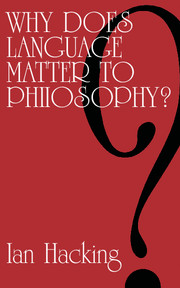2 - Thomas Hobbes' mental discourse
Published online by Cambridge University Press: 05 November 2012
Summary
Locke and other empiricists have much to say about language but it is not until the time of J. S. Mill's System of Logic (1844) that one regularly began a philosophy book like this: ‘Book i, Of Names and Propositions; Chapter 1: Of the Necessity of commencing with an Analysis of Language’. Mill deems an analysis of language necessary for the minor reasons I stated in Chapter 1. ‘An inquiry into language … is needful to guard against the errors to which it gives rise.’ ‘But there is,’ he continues, ‘another reason, of a still more fundamental nature’ for asking about language, namely that without such an enquiry, the logician cannot examine what Mill rather solemnly calls the import of Propositions. The whole work, like that of many a predecessor, is divided into four parts, of which the first is about language. The predecessors, however, do not usually say, in their titles, that they are treating of language. On the contrary, the titles are about ideas. A recent behaviourist trend may tempt us to read such students of ‘ideas’ as discussing meaning and language acquisition, but they did not see things quite our way. They did think language matters to philosophy, but to understand how it mattered to them one must try to take them on their own terms.
First, what is the point of language? In 1651 Hobbes wrote, ‘the general use of speech, is to transfer our mental discourse, into verbal; or the train of our thoughts into a train of words’ (Leviathan, i.4).
Information
- Type
- Chapter
- Information
- Why Does Language Matter to Philosophy? , pp. 15 - 25Publisher: Cambridge University PressPrint publication year: 1975
Accessibility standard: Unknown
Why this information is here
This section outlines the accessibility features of this content - including support for screen readers, full keyboard navigation and high-contrast display options. This may not be relevant for you.Accessibility Information
- 2
- Cited by
